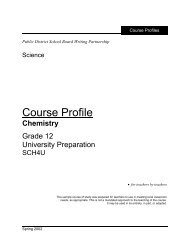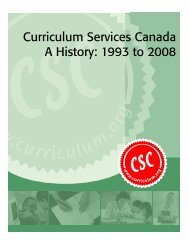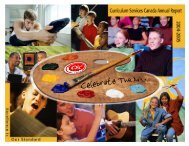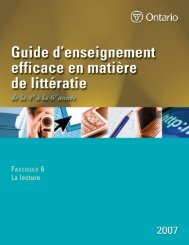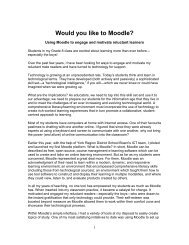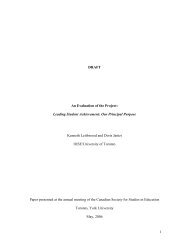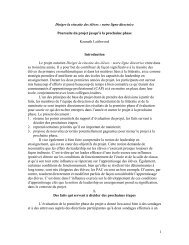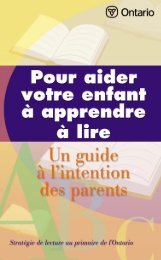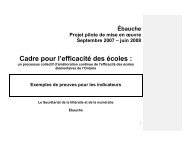Course Profile - Curriculum Services Canada
Course Profile - Curriculum Services Canada
Course Profile - Curriculum Services Canada
You also want an ePaper? Increase the reach of your titles
YUMPU automatically turns print PDFs into web optimized ePapers that Google loves.
Activity 2: Fact from Fiction: Seeking out the Truth<br />
Time: 120 – 180 minutes<br />
Description<br />
In this activity students are invited to look at print excerpts to help them detect how one deconstructs<br />
media products, in order to distinguish materials which are primarily factual versus those which are<br />
primarily fictional or opinion based. At this time students are asked to compose their own response to a<br />
piece of prose, emphasizing the conventions of persuasion to which they have been introduced.<br />
Strand(s) and Expectations<br />
Ontario Catholic School Graduate Expectations:<br />
1d - develop attitudes and values founded on Catholic social teaching and act to promote social<br />
responsibility, human solidarity and the common good;<br />
2a - listen actively and critically to understand and learn in light of gospel values;<br />
2e - use and integrate the Catholic faith tradition, in the critical analysis of the arts, media, technology<br />
and information systems to enhance the quality of life.<br />
Strand(s): Literature and Reading Studies, Writing, Language, Media<br />
Overall Expectations:<br />
LIV.01D - read and demonstrate an understanding of a variety of literary and informational texts,<br />
from contemporary and historical periods;<br />
LIV.02D - demonstrate an understanding of the elements of a variety of literary and informational<br />
forms, with a focus on plays, short stories, and short essays;<br />
LIV.03B - identify and explain the effect of specific elements of style in a variety of literary and<br />
informational texts;<br />
WRV.01D - use a variety of print and electronic sources to gather information and explore ideas for<br />
their written work;<br />
WRV.02D - identify the literary and informational forms suited to various purposes and audiences and<br />
use the forms appropriately in their own writing, with an emphasis on supporting opinions or<br />
interpretations with specific information;<br />
WRV.03D - use a variety of organizational techniques to present ideas and supporting details logically<br />
and coherently in written work;<br />
LGV.01D - use knowledge of vocabulary and language conventions to speak, write, and read<br />
competently using a level of language appropriate to the purpose and audience;<br />
LGV.02B - use listening techniques and oral communication skills to participate in classroom<br />
discussions and more formal activities, such as storytelling, role playing, and reporting/presenting, for<br />
specific purposes and audiences;<br />
MDV.01D - use knowledge of the elements, intended audiences, and production practices of a variety<br />
of media forms to analyze specific media works;<br />
MDV.02D - use knowledge of a variety of media forms, purposes, and audiences to create media<br />
works and describe their intended effect.<br />
Specific Expectations:<br />
LI1.04D - locate explicit information and ideas in texts to use in developing opinions and<br />
interpretations;<br />
LI1.05D - analyse information, ideas, and elements in texts to make inferences about meaning;<br />
LI1.07D - explain how readers' different backgrounds might influence the way they understand and<br />
interpret a text;<br />
LI3.01D - explain how authors use diction and phrasing to achieve particular effects in their writing;<br />
LI3.03D - explain how authors and editors use design elements to help communicate ideas;<br />
Unit 5 - Page 6<br />
•English - Academic



